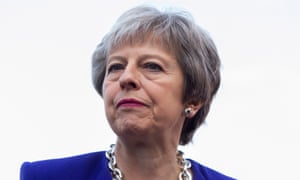The PM has to choose between two options, each with their own problems and perils
Eventually, the stalemate must end. Even if through sheer exhaustion, the cabinet infighting over which of two unacceptable customs union proposals to take into the next phase of Brexit negotiations cannot go on for ever. The question that is likely to convulse the weary world of Westminster next, however, is: what then?
The most likely route out of the current impasse is the one fraught with most difficulty. In the face of implacable ministerial opposition to her compromise new customs partnership (NCP) idea, Theresa May could quickly bring the sorry saga to an end by agreeing to go along with the maximum facilitation (max fac) model favoured by Brexiters in her cabinet.
There would undoubtedly be anxiety among moderates such as the chancellor, Philip Hammond, about the impact on British business, but for a moment or two the decision would probably come as a relief to the majority of the cabinet and the Tory party, which has fought itself to a standstill over the issue. That is, until external reality intrudes.
The first problem would come in Brussels and Dublin, where opposition to max fac is even more visceral than their suspicions about the prime minister’s NCP fudge. Only this week, the Irish government made clear that without a plausible solution for avoiding border controls, it would demand a fallback option under which Northern Ireland would stay entirely within the customs union and single market. Minimum friction and maximum facilitation are not good enough, it argues. Unless it can see a way to keep things as they are, all bets are off and all the progress so far goes out of the window.
Destabilising as it would be to lose the certainty of the recently agreed 21-month transition deal, this would be the least of Downing Street’s worries. Instead, the next battle would come in the House of Commons, where a majority of MPs seem ready to vote for a UK-wide customs union with the EU instead. A determined group of Tory rebels and Labour leaders could even be joined by May’s erstwhile allies in the Democratic Unionist party, who would be appalled by the idea of placing the border in the Irish Sea just to keep the cabinet happy.
It is possible, therefore, that Downing Street could succeed in persuading Eurosceptic ministers to hold their noses. “Agree to our customs union-lite or risk having parliament impose a full-fat version” ought to be a compelling argument for all but the diehards.
The problem is that there seem to be more diehards willing to sacrifice themselves for the cause than there are rebel remainers. Jacob Rees-Mogg has made it more explicit than ever that he and the European Research Group of Tories he leads are prepared to go to the wall over the principle of staying out of any customs agreement with Brussels.
If the prime minister insists on forcing the NCP option, she may find herself quickly facing a leadership challenge and simply leave the problem for her successor to solve.
Until now, the instinct when faced with such unpalatable choices has been to play for time. But even this tried-and-tested formula seems fraught with new difficulties. For once, Brussels seems happy to let the clock tick down. If the UK keeps fighting among itself, that leaves less time for it to argue with the other 27 members.
Instead the clock is ticking loudest in Downing Street. There is a mounting pile of unpassed legislation that whips dare not bring before parliament for fear of rebellion. Unless UK negotiators can clear the customs hurdle before the next EU summit, in June, there is almost no time left for the trade talks they so desperately need to conclude before the autumn.
For the first time since invoking article 50, the prime minister needs to make a real decision, and all the options look disastrous.
